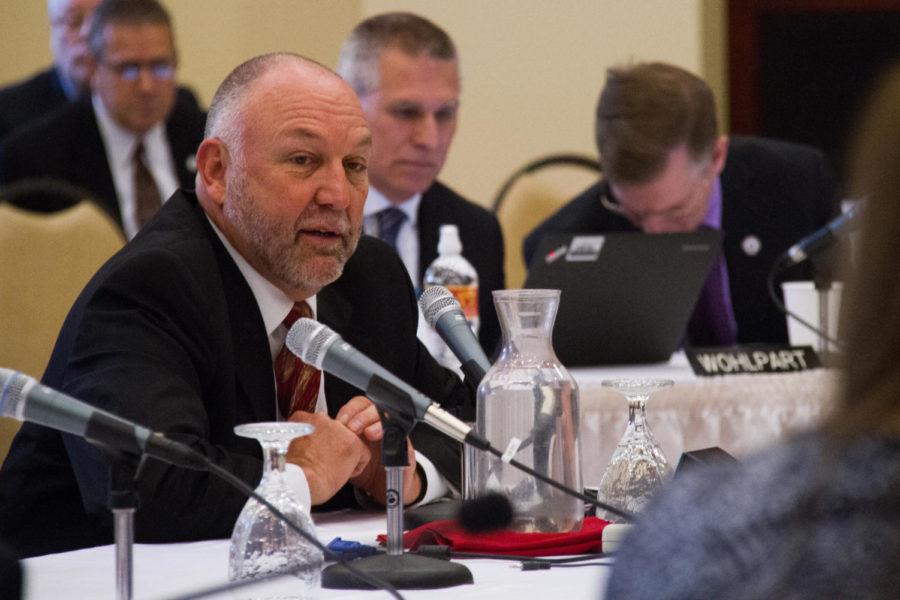Leath addresses budget cuts at Board of Regents
Iowa State president Steven Leath addresses the Board of Regents during a meeting on Feb. 23 in the Alumni Center. Leath talked how the university would respond to recent budget cuts (postponing renovations on the library, Kildee Hall, and the events center), the opening of the Student Wellness Center, and the most recent student diversity statistics.
February 23, 2017
Budget cuts became the central focus for the Board of Regents and Iowa State as President Steven Leath addressed concerns over administrative spending.
Taking place Thursday at Iowa State, all four institutional heads presented their presidential reports to the board. Leath began by acknowledging the difficulties of the $8 million budget cut, calling the repercussions “unavoidable.”
“Investment in public higher education is an investment in a prosperous Iowa long term,” Leath said.“We are facing a very difficult budget challenge. The cut we are seeing now is very unfortunate.”
Leath outlined three methods Iowa State hopes to implement in order to preserve what he called “the academic core,” including student success and faculty/staff.
The first will call for deferred maintenance and the cancellation or delay of several capital improvement plans. This will include the delay of updates to Kildee Hall as well as pulling renovations to the Iowa State Conference Center. Iowa State hopes to absorb 60 percent of the cut through this method, or about $4.7 million.
Despite Iowa State’s longtime goal of a 19-to-1 faculty-to-student ratio, Leath confirmed that vacant personnel positions will remain unfilled. About $2.2 million will be saved, however, Leath said he is aware of the potential issues of the initiative. These would include a higher staff workload and a possible hit to campus-wide morale, but he believes it is still a reasonable way to make up for the cut.
This is primarily due to Leath citing only 24 resignations in the past year at Iowa State out of 2,000 total staffers, a statistic he believes shows the overall happiness of those who work on campus.
As a final measure to save a million dollars Iowa State will wait to purchase new computer systems and halt the acquisition of several journal publications.
Looking to dispel rumors of “bloated administrative spending,” which Leath described as a “fallacy,” Iowa State quoted a recent study by The Wall Street Journal that listed the university as the seventh most efficiently run research institution in the country.
Leath also spoke about Iowa State’s 88.1 percent one-year retention rate.
“When I began I never thought a 90 percent retention rate would be possible with this many students,” Leath said. ”This is the highest rate we’ve had since beginning electronic records. It will put us in the elite category of public institutions.”
Highlighting the new Student Wellness Center, which will open Friday and aims to help students deal with stress and anxiety, Leath unveiled a new program to coincide with the center.
Dubbed the Peer Wellness Educator Program, it will aim to educate undergraduate students in fields of science-based approaches to help educate peers on health benefits. Iowa State sees peer-to-peer interaction as an important aspect of the center in order to fully meet student needs.
As a final note, Iowa State is currently represented by 120 countries around the world, creating a 1 in 4 multicultural student ratio on campus.
Pete Englin, director of the department of residence at Iowa State, spoke briefly about the future of living and eating on campus in fiscal year 2018 during the residence system governance report.
The biggest news was the recently announced unlimited meal plans that will be available for students in the fall.
The standard gold plan will be the only original bundle option returning with a fee of $3,955, featuring 100 meals and $100 in dining dollars. CyPower unlimited and Cyclone unlimited will replace the Silver, Cardinal and Cyclone bundles, costing $4,600 and $4,200, respectively. CyPower will also receive $200 available dining dollars.
Englin said the choice to create new meal options was one that had been deliberated on by several hall council groups and student voices. Because “students want value” when purchasing a plan, Iowa State moved forward in following the University of Northern Iowa and the University of Iowa by creating unlimited options, Englin said.
Residence hall rates for the 2018 fiscal year are scheduled to increase by about 3 percent, with the newly constructed Geoffroy Hall rate increasing by $176 to $6,051 for a double room and $7,866 for a single room.







